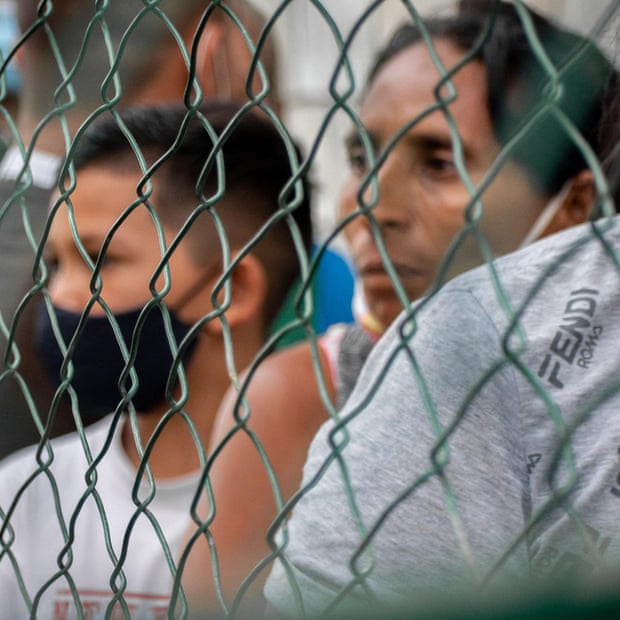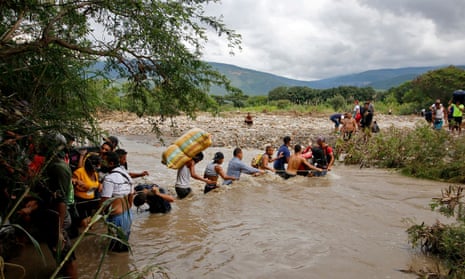The continuing exodus of millions of Venezuelans is reaching “a tipping point” as the response to the crisis remains critically underfunded.
More than 5.6 million have left the country since 2015, when it had a population of 30 million, escaping political, economic and social hardships. It has become the largest external displacement crisis in the region’s history, and the most underfunded.
“Never in our history in Latin America have we faced such movement of people out of a country that was one of the richest in the region and a country that is not at war,” said Eduardo Stein, special representative of the UNHCR, the UN refugee agency, and the International Organization for Migration (IOM). “Whatever fails in one of the largest and richest countries in the subcontinent is going to affect the rest of the region. Latin America will never be the same.”
He claimed “donor fatigue” threatened funding, saying: “This pandemic has hit very hard those developed countries who have been traditional donors.”
Q&AWhat caused the crisis in Venezuela?
Show

The crisis in Venezuela is largely a political one. With the biggest oil reserves in the world, the country made great social gains during the early years of the Hugo Chávez presidency.
When Chávez died in 2013, he was succeeded by his top aide in the socialist PSUV party, Nicolás Maduro. A recession followed in 2016 when consumer prices in Venezuela rose 800%.
In December 2016, opposition parties won a majority in the national assembly. In response, Maduro created a more powerful body, the national constituent assembly, and filled it with supporters.
The same year saw drought and electricity shortages in a country dominated by hydroelectric power. Maduro introduced blackouts and short working weeks for state workers.
Maduro was re-elected in 2018 in a poll widely seen as rigged. The national assembly leader, Juan Guaidó, declared himself interim president in January 2019 and won the backing of the US and a number of other countries. But the Venezuelan military remained loyal to Maduro, who remains in the presidential palace.
A number of opposition politicians have been arrested and many have left the country, along with more than 5 million Venezuelans, as the economy collapsed. Shortages of basic food supplies are widespread, with people forced to queue for hours or go without necessities such as medicines.
The US has imposed sanctions on Maduro, his cronies and Venezuela’s oil industry, making it hard to obtain fuel and foreign currency.
• This Q&A was amended on 25 June 2021 to remove an incorrect claim that the UN backed Juan Guaidó.
Stein hoped that a conference hosted by Canada last week would bring renewed attention “because we do not think that Latin American countries by themselves will be capable of dealing with this”.
Governments and agencies at the videoconference in Canada pledged $1.5bn (£1.1bn) in funding to respond to the crisis, including $954m in grants and $600m in loans. At least 30 countries were reported to have committed money.
Dany Bahar, senior fellow at the Brookings Institution, in Washington DC, told the Guardian there remained “a big gap” in help for Venezuelan refugees, compared with other modern crises, such as Syria.
He said the total funding per capita for Syrian refugees was more than 10 times that for Venezuelans – at $3,150 compared with $265, based on figures for 2020. Venezuela is second only in the world to Syria in terms of external displacement.
“Most of the host countries in the Venezuelan refugee crisis are in the region, and are developing countries,” Bahar said, “whereas Europe had much skin in the game in the case of the Syrians. Maybe that triggered much more generous funding.”
Last year’s UN response plan received less than half the $1.41bn requested.
The Red Cross has said it needs to raise $264m to support Venezuelans and 17 host countries over the next three years.

Border closures due to the pandemic stalled migration. But by the end of 2020, 3.9 million Venezuelans were designated as being displaced abroad without formal refugee status – but still judged in need of international protection – up from 3.6 million in 2019, according to the latest UN figures.
Stein said 1,800 to 2,000 people had been leaving Venezuela daily in the past three months, many taking dangerous paths out, including using people traffickers.
Roger Alonso Morgui, at the International Federation of Red Cross and Red Crescent societies (IFRC), said the crisis was “not news any more”, adding: “When the big population movement happened a few years ago, there was still some attention. That now has become more silent in a way.”
Morgui said the work of aid workers was complicated by the fact that the Venezuelan refugees and migrants move through several countries before reaching a final destination.
“You need to keep on providing resources all over the path, all over the way,” he said. “When you are underfunded,” he added, you “keep on going to the emergency part of the [response] and even [the funding] is not enough to cover [it]”, which makes it “really complicated to find a longer-term solution”.
The majority of refugees are being hosted in Latin America and the Caribbean. Colombia hosts more Venezuelans than any other country, accounting for 1.73 million people..
Colombia has announced that a 10-year legal status would be granted to its undocumented Venezuelans, in a move hailed by Filippo Grandi, of the UN refugee agency, as “the most important humanitarian gesture”.
Dominika Arseniuk, director in Colombia for the Norwegian Refugee Council, said “we stand at a tipping point” amid the cash shortfall.
“International solidarity and financial support is woefully insufficient and falls desperately short of what is needed to respond to the mass exodus from Venezuela,” she said.
